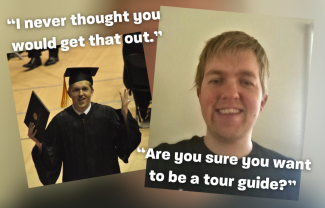Educating people about the message of their words

Certain comments about James Hayden's stammer left a mark when he first heard them. But he's since learnt to look at them and respond in a different way, seeing them instead as an opportunity to inform people about stammering.
"I never thought you would get that out."
"I was praying you wouldn't stutter."
"I feel sorry for you."
"I don’t think you should read aloud because people are focusing less on what you say and more on how you say it."
"Are you sure you want to be a tour guide?"
The above quotes were said to me at some point when I was at college from 2011 to 2015, or shortly after it. Where I am now in my journey is completely different from where I was when my voice prompted these responses.
Back then, I wasn't OK with or accepting of this part of myself. I avoided the topic of stammering like the plague and told you off if you so much as brought up the word stuttering. Now, it's a topic I won't shut up about.
Back then, I wasn't OK with or accepting of this part of myself. I avoided the topic of stammering like the plague and told you off if you so much as brought up the word stuttering.
When I heard those five quotes I experienced, and responded with, a range of emotions. For some, I responded with anger. Others, a cordial "OK, thank you." Whereas others received a stern and determined "Yeah, I still want to do it."
Regardless of my external reaction, my internal reaction was the same. The negative thoughts and emotions I was working through came back with a vengeance. Self-doubt. Shame. Embarrassment. Anger. Sadness. Frustration. "Am I good enough?" "Can I be successful as a person who stutters?" Those words brought everything I wanted to avoid to the forefront.
Those words, which only took seconds to say, left wounds that took years to heal. These wounds healed and became scars; however, they serve as a daily reminder of how, where, and from whom I received them. Yet these scars taught me a life lesson: the importance of extending grace to others. A lesson that I could only see with growth and hindsight.
More than five years later, I can honestly say they did not deserve my wrath. Rather, they deserved my grace. I now know that these comments were well intentioned..
When I first heard these comments, I was mad at the people who said them. They brought up my biggest insecurity and deserved the wrath I gave them, or so I thought. More than five years later, I can honestly say they did not deserve my wrath. Rather, they deserved my grace. I now know that these comments were well intentioned. What they said is what they believed was the right thing to tell me, even if it wasn't what I needed in that moment. They said what they thought was proper, even if it was far from proper. In those moments, I should have been kind and extended them grace. Also, I should've used those opportunities to advocate and educate them about stammering and what those comments truly mean. However, I wasn't there yet in my journey. And that's OK.
Now, I use these types of experiences to extend grace, advocate for myself and others, and educate people about the message their words are telling me. It is these scars and others I've received on my journey that inspire me to do everything in my power to be the person I needed when I was younger. A person whose daily mission is to remove the stigmas and taboos associated with stuttering to ultimately normalise it. Also, one who shows through their words and actions that is in fact OK to stutter.
Would you like to write an article? See Submit Something For The Site or email editor@stamma.org

































